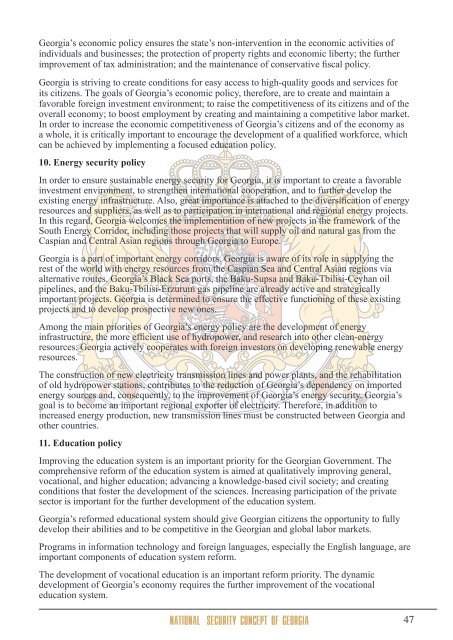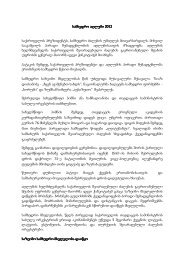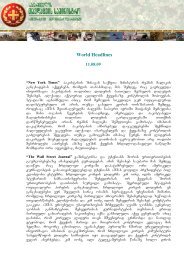saqarTvelos erovnuli usafrTxoebis koncefcia NATIONAL SECURITY
saqarTvelos erovnuli usafrTxoebis koncefcia NATIONAL SECURITY
saqarTvelos erovnuli usafrTxoebis koncefcia NATIONAL SECURITY
You also want an ePaper? Increase the reach of your titles
YUMPU automatically turns print PDFs into web optimized ePapers that Google loves.
Georgia’s economic policy ensures the state’s non-intervention in the economic activities of<br />
individuals and businesses; the protection of property rights and economic liberty; the further<br />
improvement of tax administration; and the maintenance of conservative fiscal policy.<br />
Georgia is striving to create conditions for easy access to high-quality goods and services for<br />
its citizens. The goals of Georgia’s economic policy, therefore, are to create and maintain a<br />
favorable foreign investment environment; to raise the competitiveness of its citizens and of the<br />
overall economy; to boost employment by creating and maintaining a competitive labor market.<br />
In order to increase the economic competitiveness of Georgia’s citizens and of the economy as<br />
a whole, it is critically important to encourage the development of a qualified workforce, which<br />
can be achieved by implementing a focused education policy.<br />
10. Energy security policy<br />
In order to ensure sustainable energy security for Georgia, it is important to create a favorable<br />
investment environment, to strengthen international cooperation, and to further develop the<br />
existing energy infrastructure. Also, great importance is attached to the diversification of energy<br />
resources and suppliers, as well as to participation in international and regional energy projects.<br />
In this regard, Georgia welcomes the implementation of new projects in the framework of the<br />
South Energy Corridor, including those projects that will supply oil and natural gas from the<br />
Caspian and Central Asian regions through Georgia to Europe.<br />
Georgia is a part of important energy corridors. Georgia is aware of its role in supplying the<br />
rest of the world with energy resources from the Caspian Sea and Central Asian regions via<br />
alternative routes. Georgia’s Black Sea ports, the Baku-Supsa and Baku-Tbilisi-Ceyhan oil<br />
pipelines, and the Baku-Tbilisi-Erzurum gas pipeline are already active and strategically<br />
important projects. Georgia is determined to ensure the effective functioning of these existing<br />
projects and to develop prospective new ones.<br />
Among the main priorities of Georgia’s energy policy are the development of energy<br />
infrastructure, the more efficient use of hydropower, and research into other clean-energy<br />
resources. Georgia actively cooperates with foreign investors on developing renewable energy<br />
resources.<br />
The construction of new electricity transmission lines and power plants, and the rehabilitation<br />
of old hydropower stations, contributes to the reduction of Georgia’s dependency on imported<br />
energy sources and, consequently, to the improvement of Georgia’s energy security. Georgia’s<br />
goal is to become an important regional exporter of electricity. Therefore, in addition to<br />
increased energy production, new transmission lines must be constructed between Georgia and<br />
other countries.<br />
11. Education policy<br />
Improving the education system is an important priority for the Georgian Government. The<br />
comprehensive reform of the education system is aimed at qualitatively improving general,<br />
vocational, and higher education; advancing a knowledge-based civil society; and creating<br />
conditions that foster the development of the sciences. Increasing participation of the private<br />
sector is important for the further development of the education system.<br />
Georgia’s reformed educational system should give Georgian citizens the opportunity to fully<br />
develop their abilities and to be competitive in the Georgian and global labor markets.<br />
Programs in information technology and foreign languages, especially the English language, are<br />
important components of education system reform.<br />
The development of vocational education is an important reform priority. The dynamic<br />
development of Georgia’s economy requires the further improvement of the vocational<br />
education system.<br />
<strong>NATIONAL</strong> <strong>SECURITY</strong> CONCEPT OF GEORGIA<br />
47
















